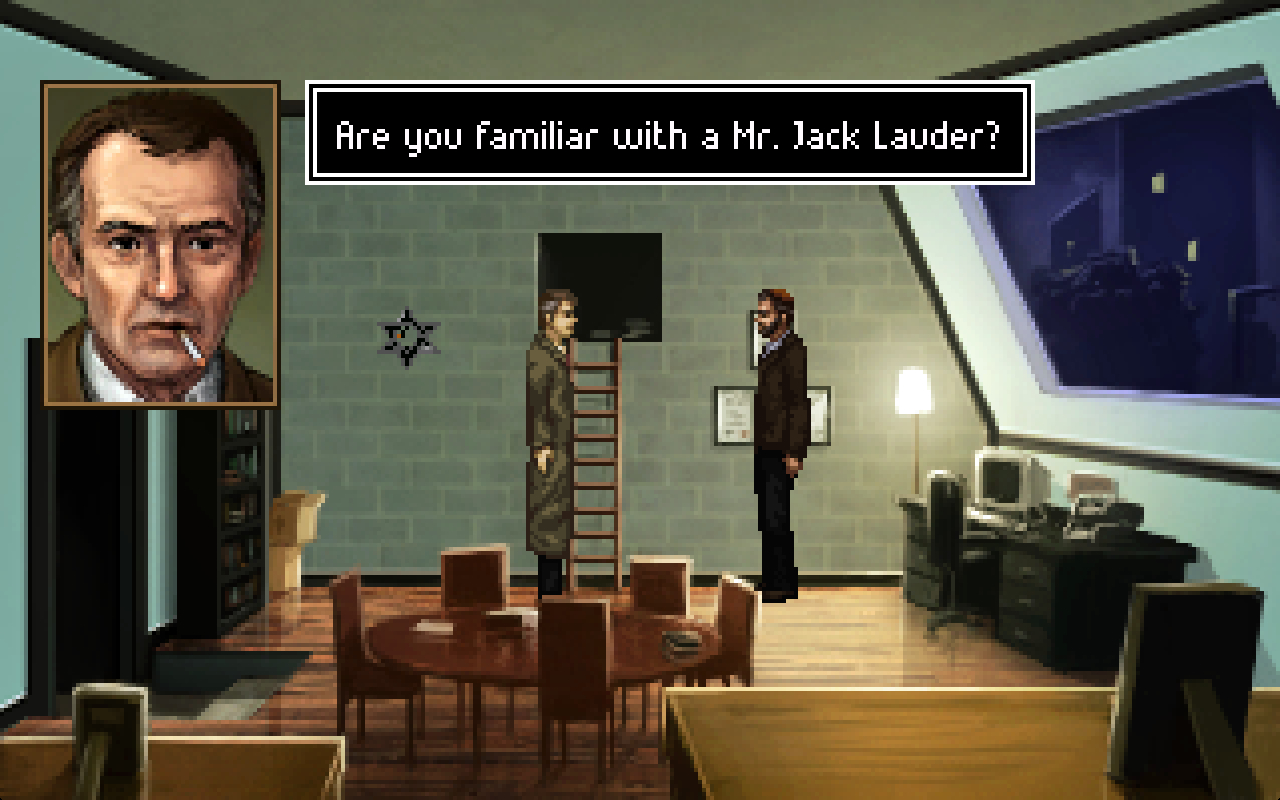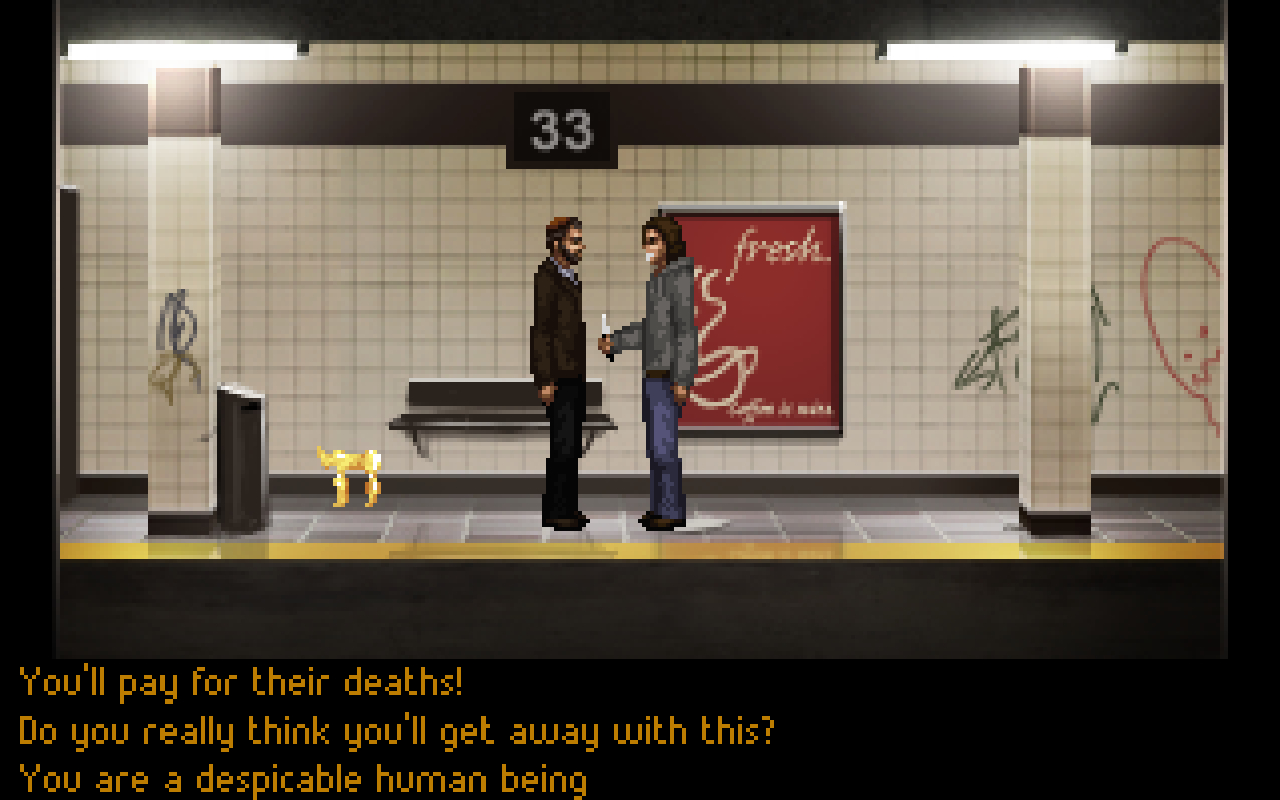Search
[{{{type}}}] {{{reason}}}
{{/data.error.root_cause}}{{{_source.title}}} {{#_source.showPrice}} {{{_source.displayPrice}}} {{/_source.showPrice}}
{{#_source.showLink}} {{/_source.showLink}} {{#_source.showDate}}{{{_source.displayDate}}}
{{/_source.showDate}}{{{_source.description}}}
{{#_source.additionalInfo}}{{#_source.additionalFields}} {{#title}} {{{label}}}: {{{title}}} {{/title}} {{/_source.additionalFields}}
{{/_source.additionalInfo}}- Details
- Category: Computer
- By J. Todd Cumming
- Hits: 5692
The Shivah: Kosher Edition (Mac)

The Shivah: Kosher Edition
Developed by: Wadjet Eye Games
Published by: Wadjet Eye Games
Released: November 22, 2013
Available on: Windows, Mac OS X, Linux, iOS, Android
Genre: Adventure
Number of players: 1
Price: $4.99 (Steam) $1.99 (Android)
(Amazon Affiliate Link)
Thank you, Sofox, for providing a gift copy of this game!
"A goy came up to Rabbi Moishe to ask, 'Why do rabbis always answer with a question?' To which Rabbi Moishe replied, 'Why not?'"
The opening lines to "The Shivah" are not just a Jewish joke, they hold a key element to the gameplay of this point-and-click adventure. "The Shivah: Kosher Edition" is an update to the original game released in 2006, which helped to launch the career of game developer Dave Gilbert and, eventually, the studio Wadjet Eye Games. Gameplay is similar to the original release, only with updated graphics, voice acting, and availability on modern devices and operating systems, including Steam.
In the game, the player steps into the shoes of Rabbi Russell Stone. The rabbi has been struggling with his temple, as his sermons have been alienating a lot of his congregation. As the bills pile up, he seriously considers giving up on his calling, his temple – and possibly even his faith. In the midst of his despair, he gets an unwelcome visitor – a police detective. Apparently, a man named Jack Lauder, a former member of Rabbi Stone's temple, has been murdered, and in his will, he left the temple $10,000. However, Lauder hated Stone, since the rabbi wouldn't officiate his marriage to a non-Jewish woman eight years previously. Being a suspect for Lauder's murder, Stone decides to do some investigating to find out why Lauder left him the money. Before too long, Stone uncovers a plot of murder, betrayal and faith that will test his own beliefs.

Strong Points: Interesting story, good voice acting; thought-provoking
Weak Points: Extremely short; graphics could be better
Moral Warnings: Language; violence
The graphical style of the game is similar to a lot of adventure games popular in the mid-to late-90s, with pixellated figures, and even the text has a highly-pixellated appearance. The portraits in the game are well done, though, with the character's expressions changing depending on their mood and dialogue. Conversation choices alternate between direct lines and attitudes, including a "rabbinical answer," in which Stone will respond to a question with another question. Questions are a key part of playing the game, and often is the best way to learn things that will progress the narrative. The game also includes numerous endings, four of which result in achievements. It is possible for the rabbi to die at several points in the game, which is a change for many adventure games of these days. A player will have to be clever and pay close attention to what's happening in order to avoid an early demise or getting stuck in the game.
Most of the gameplay consists of a typical point-and-click style, with the exception of accessing computers. To log in, the player will have to type in the proper user name and password using the keyboard. While having to guess a password may stump some players, the game contains an abundance of clues to figure out what the passwords could be. Altogether, the puzzles are not terribly difficult, and the game can be completed in two or three hours, including all the game-ending achievements. There are a few other achievements that are trickier to uncover, but with the short length of the game it shouldn't take too much experimentation to unlock them all.
Even though the game is short, it does contain an intriguing plot and interesting implications about the nature of faith, especially for those who are called to be religious leaders. It's a big responsibility, with a lot of temptations. Without trying to give away any spoilers, it does raise to mind questions about the nature of spiritual leadership, and the narrow path that needs to be followed. Does one try to adhere to the messages that God tries to give us, even if it makes a leader unpopular? Or should one sacrifice his or her own ethics or standards as laid out in the holy scriptures in order to maintain a position of comfort? In this respect, the messages of the game goes beyond Judaism, and could apply to any religious leadership.
 s
sHigher is better
(10/10 is perfect)
Game Score - 78%
Gameplay - 14/20
Graphics - 7/10
Sound - 8/10
Stability - 5/5
Controls - 5/5
Morality Score - 85%
Violence - 3/10
Language - 6.5/10
Sexual Content - 10/10
Occult/Supernatural - 10/10
Cultural/Moral/Ethical - 10/10
+3 points for providing a good moral lesson
In this reviewer's opinion, this actually touches a bit on one of my criticisms of the game – even though it focuses on Judaism, it didn't seem Jewish enough. I think it would have been a fascinating way to explore the faith and the cultural elements. The game could have featured a Baptist or Pentecostal or Latter-day Saint leader without much in the way of substantial changes.. But perhaps that was the intention of the author – even though the faith may have been non-Christian, it really isn't all that different from some of the aspects that other religious leaders face, including temptation, corruption and despair.
There are a few moral concerns to the game. Language issues do occur several times in the game. "Hell" is mentioned several times, as well as both "b-" words. Nothing stronger than that, and the references to God are done in a non-blasphemous fashion (e.g. "Would God approve of your actions?") A few people can be killed in the game, including at Rabbi Stone's hands, if the player so chooses. Blood is depicted as square red pixels, but that doesn't make the murders any less shocking. Finally, the police detective is seen smoking, and a portion of the game does take place in a bar.
All in all, "The Shivah" is a fascinating, but short, adventure game. To play the game, questions must be asked, and after the game, many questions still remain. Not so much in the game itself, but rather in the player's life and their own spiritual journey. And really, isn't that the ultimate goal of an artist? To create a work in which the viewer is left to wonder about their own nature, or the world around them and their place in it? This brings to mind another question that often comes up in this industry – can video games be considered "art?" In my opinion, because of its thought-provoking nature, "The Shivah" should certainly be considered one of the examples placed into this category.






